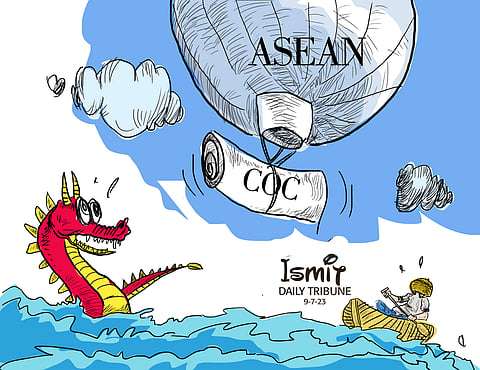
- NEWS
- the EDIT
- COMMENTARY
- BUSINESS
- LIFE
- SHOW
- ACTION
- GLOBAL GOALS
- SNAPS
- DYARYO TIRADA
- MORE

An aversion to table the West Philippine Sea conflict and speeding up the progress of the Code of Conduct, or CoC, between the Association of Southeast Asian Nations, or ASEAN, and China is very evident in the ongoing Summit in Indonesia.
The maritime conflict is not even on the official agenda and will be tackled only through optional bilateral meetings on the sidelines of the yearly assembly, which is all under the wishes of China.
ASEAN, thus, is pushing itself into irrelevance by acceding to the wishes of China and its cohorts in the regional bloc like Cambodia.
Despite its existence as an Economic Community since its inception, with full integration envisioned in 2025, much of its aspirations, including being a cohesive body to advance the interests of its members, remain a pipe dream.
The CoC would have been a stellar achievement, but it was described as a moving goal post for more than two decades.
In the ongoing ASEAN meeting, all that host Indonesia was able to commit to was a three-year deadline to finalize a CoC.
Another set of guidelines is, thus, expected after the Jakarta assembly instead of a pact that will bind all the claimants in the maritime conflict.
The guidelines, moreover, will have to be endorsed by regional leaders during the ASEAN-China Summit that is scheduled later.
The Philippines is not confident about a substantial progress in the CoC despite its being the most urgent matter to maintain stability in the region.
An official of the Department of Foreign Affairs said the outcome of talks on the long-delayed CoC will be limited "to mere reporting of past discussions."
"At most, there will be a report on what happened during the last meeting in the Philippines of the joint working group on the CoC," which hardly equates to progress.
During the third round of CoC talks in Manila from 22 to 24 August, discussions were stuck on the contentious issues of whether or not the CoC would be "legally binding."
China has historically resisted a legally binding CoC, the reason for the existence of the non-binding 2002 Declaration on the Conduct of Parties in the South China Sea, or DoC.
In 2019, Foreign Minister Wang Yi indicated his optimism that a CoC would be completed within three years, or by 2022. It is now 2023.
He also announced that China supported a CoC that had "binding force" and was "an upgraded and strengthened version" of the DoC.
The discussions then came to a head due to the different perspectives among those at the negotiating table, which are the same obstacles blocking the resolution of the maritime rift.
China has refused to recognize the Permanent Court of Arbitration award that the Philippines and other claimant countries use as a basis for their position in the DoC negotiations.
In not recognizing the arbitral ruling and insisting on its historical basis for the territorial claims, China and ASEAN are not on the same page in the negotiations, meaning that hopes for an agreement are futile.
Like what happened in the local context when the Communist Party of the Philippines sued for negotiations with the government and used it to consolidate its forces, China uses the CoC discussions as a delaying tactic to fortify its position.
Its recent release of the 10-dash line, which was a rewriting of its territorial boundaries again based on historical data, proves China is not about to change its position.
According to reports on the Summit, China will only support a legally binding code when its historical version prevails.
Another term that China wants included in the negotiations is barring countries outside the region from interfering. It also wants economic activities at sea, including oil and gas development, "to be conducted in cooperation with companies from countries outside the region."
China also wants the CoC signatories not to "hold joint military exercises with countries from outside the region, unless the parties concerned are notified beforehand and express no objection."
The untenable conditions appear designed to prevent the CoC from ever coming into being.
